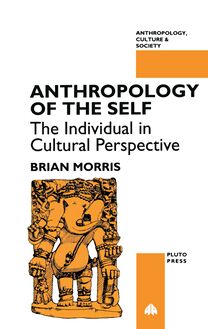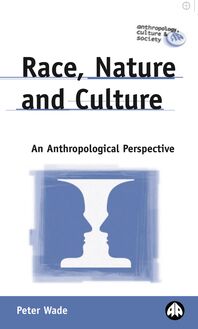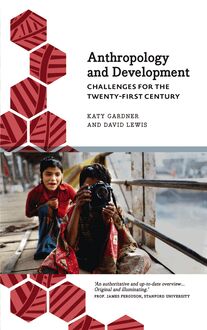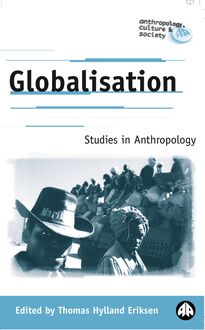-
 Univers
Univers
-
 Ebooks
Ebooks
-
 Livres audio
Livres audio
-
 Presse
Presse
-
 Podcasts
Podcasts
-
 BD
BD
-
 Documents
Documents
-
- Cours
- Révisions
- Ressources pédagogiques
- Sciences de l’éducation
- Manuels scolaires
- Langues
- Travaux de classe
- Annales de BEP
- Etudes supérieures
- Maternelle et primaire
- Fiches de lecture
- Orientation scolaire
- Méthodologie
- Corrigés de devoir
- Annales d’examens et concours
- Annales du bac
- Annales du brevet
- Rapports de stage
La lecture à portée de main
Vous pourrez modifier la taille du texte de cet ouvrage
Découvre YouScribe en t'inscrivant gratuitement
Je m'inscrisDécouvre YouScribe en t'inscrivant gratuitement
Je m'inscrisEn savoir plus
Vous pourrez modifier la taille du texte de cet ouvrage
En savoir plus

Description
Presenting a clear overview of anthropology, it focuses on central topics such as kinship, ethnicity, ritual and political systems, offering a wealth of examples that demonstrate the enormous scope of anthropology and the importance of a comparative perspective. Unlike other texts on the subject, Small Places, Large Issues incorporates the anthropology of complex modern societies. Using reviews of key works to illustrate his argument, Thomas Hylland Eriksen's lucid and accessible overview remains an established introductory text in anthropology.
This fourth edition is updated throughout and increases the emphasis on the interdependence of human worlds. It incorporates recent debates and controversies, ranging from globalisation and migration research to problems of cultural translation, and discusses the challenges of interdisciplinarity in a lucid way.
Series Preface
Preface to the Fourth Edition
1. Anthropology: Comparison and Context
2. A Brief History of Anthropology
3. Fieldwork and Ethnography
4. The Social Person
5. Local Organisation
6. Person and Society
7. Kinship as Descent
8. Marriage and Relatedness
9. Gender and Age
10. Caste and Class
11. Politics and Power
12. Exchange and Consumption
13. Production, Nature and Technology
14. Religion and Ritual
15. Language and Cognition
16. Complexity and Change
17. Ethnicity
18. Nationalism and Minorities
19. Anthropology and the Paradoxes of Globalisation
20. Public Anthropology
Epilogue: Making Anthropology Matter
Bibliography
Index
Sujets
Informations
| Publié par | Pluto Press |
| Date de parution | 20 août 2015 |
| Nombre de lectures | 0 |
| EAN13 | 9781783715183 |
| Langue | English |
Informations légales : prix de location à la page 0,1350€. Cette information est donnée uniquement à titre indicatif conformément à la législation en vigueur.
Extrait
Small Places, Large Issues
Anthropology, Culture and Society
Series Editors: Professor Vered Amit, Concordia University and Professor Christina Garsten, Stockholm University
Recent titles:
Becoming Arab in London: Performativity and the Undoing of Identity
R AMY M. K. A LY
Community, Cosmopolitanism and the Problem of Human Commonality
V ERED A MIT AND N IGEL R APPORT
Home Spaces, Street Styles: Contesting Power and Identity in a South African City
L ESLIE J. B ANK
In Foreign Fields: The Politics and Experiences of Transnational Sport Migration
T HOMAS F. C ARTER
Dream Zones: Anticipating Capitalism and Development in India
J AMIE C ROSS
A World of Insecurity: Anthropological Perspectives on Human Security
E DITED BY T HOMAS E RIKSEN , E LLEN B AL AND O SCAR S ALEMINK
A History of Anthropology Second Edition
T HOMAS H YLLAND E RIKSEN AND F INN S IVERT N IELSEN
Ethnicity and Nationalism: Anthropological Perspectives Third Edition
T HOMAS H YLLAND ERIKSEN
Fredrik Barth: An Intellectual Biography
T HOMAS H YLLAND E RIKSEN
At the Heart of the State: The Moral World of Institutions
D IDIER F ASSIN ET AL.
Discordant Development: Global Capitalism and the Struggle for Connection in Bangladesh
K ATY G ARDNER
Anthropology and Development: Challenges for the Twenty-first Century
K ATY G ARDNER AND D AVID L EWIS
Organisational Anthropology: Doing Ethnography in and Among Complex Organisations
E DITED BY C HRISTINA G ARSTEN AND A NETTE N YQVIST
Border Watch: Cultures of Immigration, Detention and Control
A LEXANDRA H ALL
Anthropology’s World: Life in a Twenty-First Century Discipline
U LF H ANNERZ
Humans and Other Animals: Cross-cultural Perspectives on Human–Animal Interactions
S AMANTHA H URN
Flip-Flop: A Journey Through Globalisation’s Backroads
C AROLINE K NOWLES
The Anthropology of Security: Perspectives from the Frontline of Policing, Counter-Terrorism and Border Control
E DITED BY M ARK M AGUIRE , C ATARINA F ROIS AND N ILS Z URAWSKI
The Gloss of Harmony: The Politics of Policy Making in Multilateral Organisations
E DITED BY B IRGIT M ÜLLER
Contesting Publics: Feminism, Activism, Ethnography
L YNNE P HILLIPS AND S ALLY C OLE
Food For Change: The Politics and Values of Social Movements
J EFF P RATT AND P ETER L UETCHFORD
Checkpoint, Temple, Church and Mosque: A Collaborative Ethnography of War and Peace
J ONATHAN S PENCER , J ONATHAN G OODHAND , S HAHUL H ASBULLAH , B ART K LEM , B ENEDIKT K ORF AND K ALINGA T UDOR S ILVA
Race and Ethnicity in Latin America Second Edition
P ETER W ADE
Race and Sex in Latin America
P ETER W ADE
The Capability of Places: Methods for Modelling Community Response to Intrusion and Change
S ANDRA W ALLMAN
The Making of an African Working Class: Politics, Law and Cultural Protest in the Manual Workers’ Union of Botswana
P NINA W ERBNER
Small Places, Large Issues
An Introduction to Social and Cultural Anthropology
FOURTH EDITION
Thomas Hylland Eriksen
First published 1995 Revised fourth edition published 2015 by Pluto Press 345 Archway Road, London N6 5AA
www.plutobooks.com
Copyright © Thomas Hylland Eriksen 1995, 2001, 2010, 2015
The right of Thomas Hylland Eriksen to be identified as the author of this work has been asserted by him in accordance with the Copyright, Designs and Patents Act 1988.
British Library Cataloguing in Publication Data A catalogue record for this book is available from the British Library
ISBN 978 0 7453 3695 4 Hardback
ISBN 978 0 7453 3593 3 Paperback
ISBN 978 1 7837 1517 6 PDF eBook
ISBN 978 1 7837 1519 0 Kindle eBook
ISBN 978 1 7837 1518 3 EPUB eBook
This book is printed on paper suitable for recycling and made from fully managed and sustained forest sources. Logging, pulping and manufacturing processes are expected to conform to the environmental standards of the country of origin.
Typeset by Stanford DTP Services, Northampton, England sText design by Melanie Patrick
Simultaneously printed by CPI Antony Rowe, Chippenham, UK and Edwards Bros in the United States of America
Contents
Series Preface
Preface to the Fourth Edition 1. Anthropology: Comparison and Context 2. A Brief History of Anthropology 3. Fieldwork and Ethnography 4. The Social Person 5. Local Organisation 6 . Person and Society 7 . Kinship as Descent 8 . Marriage and Relatedness 9 . Gender and Age 10 . Caste and Class 11 . Politics and Power 12 . Exchange and Consumption 13 . Production, Nature and Technology 14 . Religion and Ritual 15 . Language and Cognition 16 . Complexity and Change 17 . Ethnicity 18 . Nationalism and Minorities 19 . Anthropology and the Paradoxes of Globalisation 20 . Public Anthropology
Epilogue: Making Anthropology Matter
Bibliography
Index
Series Preface
Anthropology is a discipline based upon in-depth ethnographic works that deal with wider theoretical issues in the context of particular, local conditions – to paraphrase an important volume from the series: large issues explored in small places . This series has a particular mission: to publish work that moves away from an old-style descriptive ethnography that is strongly area-studies oriented, and offer genuine theoretical arguments that are of interest to a much wider readership, but which are nevertheless located and grounded in solid ethnographic research. If anthropology is to argue itself a place in the contemporary intellectual world, then it must surely be through such research.
We start from the question: ‘What can this ethnographic material tell us about the bigger theoretical issues that concern the social sciences?’ rather than ‘What can these theoretical ideas tell us about the ethnographic context?’ Put this way round, such work becomes about large issues, set in a (relatively) small place, rather than detailed description of a small place for its own sake. As Clifford Geertz once said, ‘Anthropologists don’t study villages; they study in villages.’
By place, we mean not only geographical locale, but also other types of ‘place’ – within political, economic, religious or other social systems. We therefore publish work based on ethnography within political and religious movements, occupational or class groups, among youth, development agencies, and nationalist movements; but also work that is more thematically based – on kinship, landscape, the state, violence, corruption, the self. The series publishes four kinds of volume: ethnographic monographs; comparative texts; edited collections; and shorter, polemical essays.
We publish work from all traditions of anthropology, and all parts of the world, which combines theoretical debate with empirical evidence to demonstrate anthropology’s unique position in contemporary scholarship and the contemporary world.
Professor Vered Amit Professor Christina Garsten
Preface to the Fourth Edition
This book, now in its fourth, revised and updated edition, is a rather conventional introduction to social and cultural anthropology. As the chapter titles indicate, the book does not represent an attempt to reinvent or revolutionise the subject. What I aim to do is simply to introduce the main tools of the craft, the theoretical discussions, the key figures, the main subject-areas and a representative selection of empirical fields studied by anthropologists. By ‘conventional’, incidentally, I do not necessarily mean ‘boring’. (Innovation is not always a good thing. Who wants to go to an innovative dentist? Or to fly with an innovative pilot keen to explore alternative knowledge systems?)
Today, anthropology is a global discipline, but it is unevenly distributed across the globe. English is the dominant language of anthropological discourse, more so today than in its early days, but important research is also being carried out in other languages, from Russian and Japanese to French and Spanish. It is beyond my abilities to do justice to all these national traditions of anthropology, but I have made some feeble attempts. It remains a fact, though, that this book is written from a vantage-point in Anglophone anthropology. For many years, it was common to distinguish between a British ‘social’ and an American ‘cultural’ anthropology. Today, this boundary is blurred, and although the distinction is sometimes highlighted in the text, the book is deliberately subtitled with ‘social and cultural anthropology’ in a bid to overcome an ultimately unproductive boundary.
The most controversial aspect of this book may be the prominence given to classic anthropological research in several of the chapters. In my view, it is not only a great advantage to be familiar with the classic studies in order to understand later trends and debates, but I also remain convinced that a sound grasp of mid-twentieth-century anthropology is essential for doing good research in the twenty-first century. Since many students no longer systematically read classic monographs and articles, the capsule reviews provided here may also give an understanding of the context of contemporary research – its intellectual origins and theoretical debates on which it elaborates. I do not want to give the impression that contemporary anthropologists are dwarfs standing on the shoulders of giants, but they do stand on the shoulders of anthropologists of very considerable merit, and their work needs to be known, even if superficially, in order to understand properly what anthropological researchers are doing now. Some of these people were actually quite impressive.
The general development of this book, both at the theoretical and at the empirical level, moves from simple to increasingly complex models and sociocultural environments – from the social person to the global information society. The book is intended as a companion volume to ethnographic monographs, which remain an indispensable part of an anthropologist’s training, notwithstanding the summaries a textbook is capable of providing.
-
 Univers
Univers
-
 Ebooks
Ebooks
-
 Livres audio
Livres audio
-
 Presse
Presse
-
 Podcasts
Podcasts
-
 BD
BD
-
 Documents
Documents
-
Jeunesse
-
Littérature
-
Ressources professionnelles
-
Santé et bien-être
-
Savoirs
-
Education
-
Loisirs et hobbies
-
Art, musique et cinéma
-
Actualité et débat de société
-
Jeunesse
-
Littérature
-
Ressources professionnelles
-
Santé et bien-être
-
Savoirs
-
Education
-
Loisirs et hobbies
-
Art, musique et cinéma
-
Actualité et débat de société
-
Actualités
-
Lifestyle
-
Presse jeunesse
-
Presse professionnelle
-
Pratique
-
Presse sportive
-
Presse internationale
-
Culture & Médias
-
Action et Aventures
-
Science-fiction et Fantasy
-
Société
-
Jeunesse
-
Littérature
-
Ressources professionnelles
-
Santé et bien-être
-
Savoirs
-
Education
-
Loisirs et hobbies
-
Art, musique et cinéma
-
Actualité et débat de société
- Cours
- Révisions
- Ressources pédagogiques
- Sciences de l’éducation
- Manuels scolaires
- Langues
- Travaux de classe
- Annales de BEP
- Etudes supérieures
- Maternelle et primaire
- Fiches de lecture
- Orientation scolaire
- Méthodologie
- Corrigés de devoir
- Annales d’examens et concours
- Annales du bac
- Annales du brevet
- Rapports de stage




















